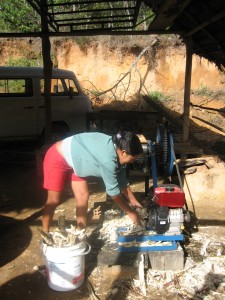
Every other Saturday throughout the year, in the city of Belo Horizonte, Brazil, you’ll find a small farmers’ market bringing together local producers of organic and natural food and products as well as local families shopping for fresh local goods. In Brazil, 80% of the population lives in cities, where people are often disconnected from the agricultural areas, but the farmers’ market brings urban and rural in direct contact.
That farmers’ market is organized and run by Global Greengrants Fund/CASA (A member of Global Greengrants Fund Alliance of Funds) grantee Rede Terra Viva, an informal cooperative of producers and consumers of organic and eco-friendly products. The goal of the market is to promote the connection between healthy products and systems of production that are socially and environmentally responsible. The market provides local producers with a sustainable source of income that doesn’t degrade the earth or its natural resources.

Taking Goods to Market
Two of the producers at this market are also Global Greengrants Fund grantees: Associação dos Moradores, Agricultores e Apicultores da Lapinha (Ama Lapinha) and Instituto de Permacultura Ecovida São Miguel (Ecovida).
Ama Lapinha used one small grant from Global Greengrants Fund/CASA to buy equipment to process sugar cane, which is now used by the entire community. The organization then received a second grant to purchase an office space, two scales to weigh the sugar, and a machine to seal plastic bags, enabling them to sell their sugar at farmers’ markets like Rede Terra Viva’s. Ama Lapinha plans to obtain food certifications in the future, enabling them to expand sales to more markets in the area.

Ecovida sells natural cosmetics at Rede Terra Viva’s farmers’ market and is hoping to expand into others in the area. They used a small grant from Global Greengrants Fund/CASA to create a community map, locating the different types of produce grown in the area and noting other produce that could potentially be grown. The current focus is on medicinal plants, but farmers will soon expand into other produce.
Ecovida is also concerned about their environmental impact, so they run an ecovillage near the community of Moeda. The village includes a variety of fruits and vegetables planted using permaculture techniques, rainwater harvesting systems, and all recycled or compostable materials. The group recently built a yurt, or mud-covered dwelling, to house volunteers and visitors and for use as a classroom and meeting space.
Keeping it Local
Growing and selling locally creates a more sustainable agriculture industry, requiring less packaging and transportation and keeping money in local communities. Farmers’ markets in Brazil and other countries provide an opportunity for urban to meet rural, for consumer to meet producer, and to promote local farms and business.
